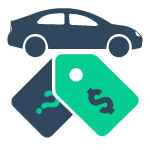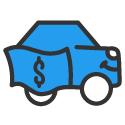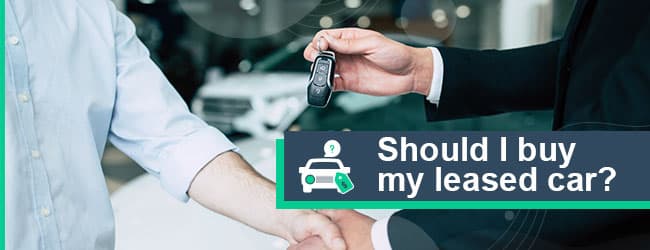Quick Answer:
Once the current market value of your leased vehicle surpasses its buyout price, it indicates that buying the car could be a wise choice.
Additionally, consider if acquiring the car reduces your monthly expenses, review the vehicle’s maintenance records, and assess if the car meets your current and future needs.
Key Takeaways:
- Buyout Price vs. Market Value: Consider buying your leased car if its buyout price is lower than the current market value, potentially leading to savings or profit from resale.
- Monthly Expense Analysis: Compare the costs of continuing the lease against the expenses of buying the car. Buying might be more economical if monthly loan payments are lower than lease payments.
- Car Condition and Maintenance: If your leased car is well-maintained, purchasing it can be beneficial. You’re familiar with its history, and a well-cared-for car often has better longevity and resale value.
- Exceeding Mileage Limits and Wear: If you’ve exceeded the lease’s mileage limits or the car has significant wear and tear, buying it can save you from hefty lease-end charges.
When Should You Buy Your Leased Car:
1. Buyout Price is Lower than Car’s Value
Upon signing a lease agreement, the leasing company typically establishes a buyout price. This is the amount you would have to pay to purchase the car at the end of the lease term.
Buying the car can be a wise choice if its buyout price is less than its current market value.
The buyout price of a leased car is primarily determined by its residual value.
The leasing company estimates the residual value at the beginning of the lease and represents the car’s expected worth at the end of the lease term.
The formula to calculate the buyout price:
(Residual value+Lease buyout fee+Remaining lease payments)+(Residual value×Sales tax)+Additional fees=Lease buyout price
Occasionally, the buyout price set for a leased car may be less than its current market value. In such instances, purchasing your leased car could be more cost-effective than buying a new one, or you could opt to resell it and retain the profit from the difference.
EXAMPLE:
- Buyout price: $17,000
- Current market value: $18,000
In this scenario, you can save $1,000 by purchasing your leased car instead of buying the same model through a private sale.

2. Buying Leased Car Reduces Monthly Expenses
Let’s say your buyout price is $25,000, and you are planning to finance the whole amount. If your interest rate is 5%, your monthly loan payments for a standard 60-month period will be $500
If your monthly lease payments are higher than loan payments, it is wise to consider buying the vehicle.
Financial expert recommendation:
Car expenses, including insurance and fuel costs, should not exceed 10-15% of your monthly income.
If your lease or loan payments are higher than this percentage, you should consider either leasing a more affordable vehicle or buying a used car that has lower monthly costs.
If you have additional money, it is recommended to make a down payment to lower monthly payments.
A good rule of thumb is to put down 10% to 20% of the car’s purchase price.
Difference between making a down payment vs. not making a down payment:
| Option | Loan amount | Interest rate | Monthly payment | Total cost |
|---|---|---|---|---|
| No down payment | $25,000 | 5% | $500 | $3,000 |
| $5,000 down payment | $20,000 | 5% | $416.67 | $24,999 |
As you can see, paying a down payment reduces monthly payments and lowers the total cost of the vehicle by $5,000.
3. Your Leased Car is Well Maintained
If you have consistently maintained your leased car, buying it out at the end of your lease term is a worthwhile consideration. A car that’s been well looked after tends to not only perform better but also retain its value more effectively, rendering it a smarter investment.
Purchasing your leased car means acquiring a vehicle you’re thoroughly familiar with and have meticulously maintained, offering the prospect of many more years of dependable service.
The benefits of buying a well-maintained leased car:
- Reliability: knowing the car’s full history removes any doubts about its past, providing peace of mind from its consistent care.
- Longevity: well-maintained cars typically have a longer lifespan, allowing you to delay the purchase of a new car.
- Higher Resale Value: well-serviced and cared-for cars often command a higher price in the market. If you decide to sell your leased car later, it’s likely you’ll recover a substantial part of your investment.
4. Exceeded Mileage Allowance
Lease agreements typically have defined mileage limits, and surpassing these can lead to expensive overage charges.
When leasing a car, the maximum annual mileage allowance usually ranges from 10,000 to 15,000 miles. For each mile exceeded, the fee generally falls between $0.10 to $0.25.
EXAMPLE:
If you lease a car with an allowance of 12,000 miles per year and end up driving 15,000 miles, this exceeds your allowance by 3,000 miles. With a penalty rate of $0.10 for each mile over the limit, as stated in your contract, you would face a fine of $300.
In conclusion, if your monthly driving mileage consistently exceeds the lease allowance, it would be more advantageous to purchase the leased car.
5. The Car Has Excess Wear and Tear
Excessive wear and tear beyond what is considered ‘normal’ by the leasing company can result in penalties. The cost of these penalties varies based on the car, the leasing company, and the degree of wear and tear.
On average, the cost of wear and tear on a leased car is estimated to be around $1,200.
In leased cars, the most frequently damaged items are tires, wheels, and the interior. The repair cost depends on the extent of the damage.
Tires are usually the costliest to replace, averaging around $500, while repairs to the car’s interior are typically less expensive, with an average cost of about $200.
6. Car Fits Your Future Needs
If your current vehicle fulfills all your requirements and you intend to use it for an extended period, purchasing it can enable you to accumulate equity in the car. This accumulated equity could contribute to cost savings on your next vehicle purchase.
Additionally, owning the car gives you greater control over its maintenance and repairs.
Should you anticipate that your needs might change, it’s prudent to continue leasing or buy a new vehicle that better aligns with your evolving lifestyle.
Opting for leasing means you won’t have to concern yourself with maintenance and repairs, and it allows you the flexibility to drive a new car every 2 to 3 years.
Reasons You Shouldn’t Buy Your Leased Car
- The buyout price exceeds the car’s value.
- A leased car does not fit your future needs.
- Car requires maintenance and costly repairs.
- You are overall dissatisfied with the car.
- Financial limitations.
Pros of Buying Your Leased Car
- No mileage limitations: no monthly mileage limits or hefty over-mileage penalties.
- Familiarity with the vehicle: knowing the vehicle’s history and condition can give you peace of mind about its reliability and potential future maintenance needs.
- Financial flexibility with a buyout loan: a lease buyout loan offers the opportunity to finance the purchase of the leased vehicle. This approach can avoid a large upfront payment, and by the end of the loan, you’ll fully own the vehicle. Having equity in the car at the end of the loan period can also be beneficial for future purchases.
- No wear and tear penalties – you might have to pay additional fees if the car has any damage beyond the “normal wear and tear”. Buying the car would allow you to avoid these penalties.
- Potential profits – if the purchase price of the car is less than the market value, it could be a good deal to buy, especially if you are planning to resell it.
Cons of Buying Your Leased Car
• Higher cost over time – buying out your lease is highly likely will result in paying more in total compared to if you had bought the car outright initially due to lease fees and finance charges.
• More financing or cash outlay – if you decide to buy the car at the end of your lease, you’ll either need to have the cash available to pay the buyout price or finance the balance, which could add more debt.
• Less warranty protection – the manufacturer’s warranty that often comes with a new car lease expires by the time you decide to buy, which means you’ll be responsible for any repair costs.
• Changing technology – if you enjoy having the latest technology or safety features, buying your leased car means you’ll be missing out on any advancements that have come out since you started your lease.
What if You Decided Not to Buy Your Leased Car?
If you decide against purchasing your leased car, several alternatives are available:
• Return the car to the leasing company – schedule a pre-return inspection, where the leasing company will evaluate the car for any excessive wear and tear or mileage overages.
• Lease a new car—Sign a new lease with either the same or a different car manufacturer or dealership, giving you the opportunity to drive relatively new cars equipped with the latest technology and safety features continuously.
• Extend the lease—Some leasing companies may offer the option to extend your current lease if you need more time to decide. This extension can afford you additional time to contemplate whether to lease a new car, purchase a car, or potentially buy the car you are currently leasing.
What Does it Mean to Lease a Car?
Leasing a car essentially means renting it from a dealership, a bank, a leasing company, or another owner for a specified length of time and a set number of miles.
When you lease a car, you do not own it and are required to return it at the end of the lease period unless you opt to buy it out.
Is Residual Value the Same as Buyout?
The residual value and the buyout price of a leased car are related but distinct concepts:
- Residual Value: is based on three key components: the capitalized cost (essentially the sale price of the car), the lease term (typically 24-36 months), and the residual lease value percentage (depreciation over the lease term).
- Buyout Price: consists of your remaining lease payments, the car’s residual value, and any additional taxes or fees imposed by the leasing company.
This means the buyout amount is not simply the residual value but rather a sum of various components related to the lease agreement.
What if You Want to Buy Your Leased Car but Don’t Have the Money?
In this case, you should get a lease buyout loan. The loan will be for the amount of the buyout price plus any fees or taxes. Good credit is required to qualify for a lease buyout loan.
If taking a loan is not an option, you should keep leasing until your financial situation allows you to buy the car or consider buying a used car from a private party.
Can You Sell or Trade in the Leased Car?
Using tools such as the Kelley Blue Book car value calculator, you can estimate your car’s worth and whether you can sell it for a profit.
Keep in mind that selling privately can take you up to 52 days and will require at least 15 hours of your additional time.
Choosing to trade in or sell your car online simplifies and speeds up the process, though it typically results in a lower return compared to private sales.
EXAMPLE:
If you buy a leased car for $25,000, its current market value is $27,000, and you can expect to earn a $2,000 profit.
However, in this case, you will be required to pay capital gain tax, which can cost you anywhere from $0 to $640.



